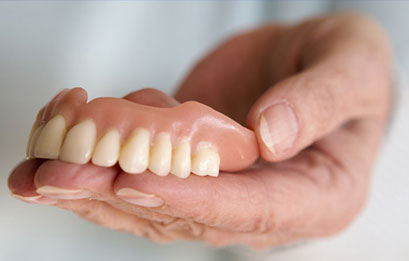Dentures
I want dentures. Where do I start?
The best starting point to see if dentures are an option for you is to see your general dentist or a prosthodontist. A prosthodontist is a specialist with an additional three years of training after dental school who focuses on the restoration and replacement of teeth, including dentures for even the most complex cases. A prosthodontist also will be able to help determine if another treatment option might be more suited to your particular situation.
What types of dentures are there?
Dentures may replace all the teeth or only some of the teeth. The dentures that replace all the teeth are known as complete dentures and they rest on thegums that cover the jawbones. The stability and retention of these dentures can be improved by attaching them to dental implants. Dentures that replace some but not all of the teeth are known as partial dentures.They attach to the teeth that are still present and also cover and rest on the gums and bone where the teeth are missing. Dental implants can also be used to restore and stabilize partial dentures as well.
How can I whiten my dentures?
It is not possible to whiten dentures like natural teeth because dentures are made of plastic.To minimize staining, properly clean your dentures daily to remove food and plaque bacteria.Brushing with a denture brush or soft toothbrush will prevent dentures from becoming permanently stained and keep your mouth healthy. Moisten the brush and apply a nonabrasive soap or denture paste (regular toothpaste is too abrasive). Brush every surface,inside and out, scrubbing gently. A variety of over the counter denture cleanser products may be safely used (by following the manufacturer’s instructions) to remove most stains. A weekly 10 minute soak in dilute household bleach is recommended but discuss it with your dentist first. However More stubborn stains may require removal by your dentist or prosthodontist. a specialist in denture care and maintenance.
Can I brush my dentures with toothpaste?
No, toothpastes are designed to be used on teeth, and they often contain materials and chemicals that help whiten and strengthen teeth, but may harm dentures, which are made of a very durable plastic.Even though the plastic is strong, it is not as strong as the enamel of teeth and may be scratched by using toothpaste to clean your dentures. You should use a dish washing liquid and a special denture brush to clean your dentures by hand every day. After rinsing them thoroughly, soak your dentures in waterbased cleaning solution overnight. Do not use bleach on your dentures unlesscitation needed your dentist or prosthodontist gives you special instructions on using bleach. Dilute household bleach can be used to clean and disinfect your denture, but don’t use bleach until you see your dentist for instructions.
Can I sleep in my dentures?
Yes, you can wear your dentures at night but it is preferred that they be removed.You should remove your dentures at night and this will give your gums and bone a chance to relax from the pressure of the denture during the day. If you need to wear your dentures for social reasons or to prevent your jaws from over closing, you should find time during the day to properly clean your mouth and your prostheses. You should never wear your dentures 24 hours a day without preforming proper oral hygiene. Dentures should be cleaned at night and stored in water during the night. Dentures can be made to look like your teeth or, if you want changes in your teeth, the dentures can be made to improve your appearance. You should work with your dentist or prosthodontist and tell him/her how you would like tolook. You may want to seek the care of a prosthodontist, a dental specialist with three years of additional training in the restoration and replacement of teeth, including dentures.
Can I eat normally with dentures?
Most patients need to learn how use dentures properly and as a result, it takes a little time to get used to them.After a while, you should be able to eat fairly normally, but it may take more time to get comfortable with harder foods or sticky foods. Using a small amount of denture adhesive (no more than three or four peasized dabs on each denture) may help stabilize the dentures and help hold them in place while you learn how to get comfortable with them and may make the learning process easier.





